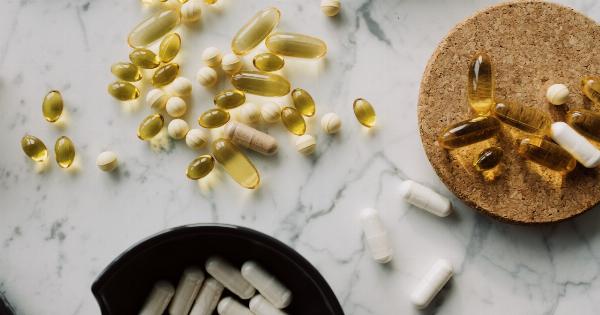Depression is a serious mental health condition that affects millions of people across the world. It is characterized by feelings of sadness, hopelessness, and a loss of interest in normal activities.
While therapy and medication are effective treatments for depression, diet and nutrition can also play a role.
1. Eat a Balanced Diet
A balanced diet is essential for maintaining good mental health. The National Institute of Mental Health recommends eating a variety of fruits, vegetables, whole grains, lean protein, and healthy fats to promote brain function and overall well-being.
You should aim to include these types of foods in your diet:.
- Fruits and vegetables: Aim to eat at least five servings of fruits and vegetables per day. Opt for brightly colored produce, as these tend to be the richest in vitamins and minerals.
- Whole grains: Whole grains are rich in fiber and B vitamins. Opt for whole grain bread, pasta, and rice instead of refined grains.
- Lean protein: Chicken, fish, beans, and tofu are all great sources of lean protein. They can help keep you feeling full and energized throughout the day.
- Healthy fats: Omega-3 fatty acids, found in fatty fish like salmon and mackerel, as well as nuts and seeds, can help reduce inflammation and improve brain function.
2. Manage Your Sugar Intake
Sugar has been linked to a range of health problems, including depression. Consuming too much sugar can lead to unstable blood sugar levels, which can cause mood swings and fatigue.
It can also cause inflammation in the brain, which has been linked to depression and other mental health conditions.
To manage your sugar intake, it is important to avoid sugary drinks like soda and sports drinks, as well as processed foods like candy, cookies, and cake. Opt for whole fruits instead of fruit juice, and avoid adding sugar to your tea or coffee.
3. Choose Foods That Boost Serotonin
Serotonin is a neurotransmitter that plays a key role in regulating mood. Certain foods can help increase serotonin levels naturally, which can help alleviate symptoms of depression.
Some of the best foods for boosting serotonin include:.
- Bananas: Bananas are rich in tryptophan, an amino acid that helps boost serotonin levels. They are also a good source of vitamins and minerals.
- Dark chocolate: Dark chocolate contains compounds that can help improve mood and reduce stress levels.
- Nuts and seeds: Nuts and seeds are rich in healthy fats and protein, which can help stabilize blood sugar levels and boost serotonin.
4. Avoid Alcohol and Caffeine
While a glass of wine or a cup of coffee may seem like a good way to unwind, both alcohol and caffeine can have a negative impact on mental health.
Alcohol is a depressant and can exacerbate symptoms of depression. It can also interfere with sleep and worsen anxiety. Caffeine, on the other hand, can cause jitters, anxiety, and sleep disturbances.
If you are struggling with depression, it is best to avoid alcohol and caffeine altogether or limit them as much as possible.
5. Don’t Skip Meals
Skipping meals can cause your blood sugar levels to drop, which can cause mood swings and fatigue. It can also make you more likely to reach for unhealthy snacks or overeat at your next meal.
To combat this, make sure to eat regular meals throughout the day. Set an alarm if you need a reminder, and try to plan your meals and snacks in advance to make sure you are getting all the nutrients you need.
6. Consider Taking Supplements
In some cases, supplements may be helpful in managing symptoms of depression. Talk to your doctor before taking any supplements, as they can interact with some medications and may not be safe for everyone.
Some supplements that may be helpful include:.
- Omega-3 fatty acids: Omega-3s are essential for brain health and can help reduce inflammation and improve mood.
- Vitamin D: Vitamin D deficiency has been linked to depression, and many people do not get enough of this nutrient from their diet alone.
- B vitamins: B vitamins, particularly vitamin B12 and folate, are important for brain function and may help reduce symptoms of depression.
7. Practice Mindful Eating
Mindful eating is a strategy for improving your relationship with food and promoting a healthy mindset. It involves paying close attention to your physical and emotional cues while eating, and eating with intention and purpose.
Some tips for practicing mindful eating include:.
- Eat slowly and savor your food: Take the time to enjoy the flavors and textures of your food.
- Listen to your body: Pay attention to your hunger and fullness cues, and stop eating when you are satisfied.
- Avoid distractions: Eating while watching TV or scrolling through your phone can make it difficult to tune into your body’s signals.
- Practice gratitude: Take a moment before each meal to express gratitude for the food on your plate and the people who made it possible.
8. Seek Professional Help
If you are struggling with depression, it is important to seek professional help from a qualified mental health professional. This may include therapy, medication, or a combination of both.
A psychiatrist can help you develop a treatment plan that meets your unique needs and provide support and guidance as you work to improve your mental health.
9. Be Kind To Yourself
Remember that managing depression is a journey, not a destination. Be kind and patient with yourself as you work to develop healthy eating habits and improve your mental health.
Set small goals and celebrate your successes along the way. Remember that every step you take towards better health is a step in the right direction.
10. Stay Consistent
Finally, it is important to remember that consistency is key. Developing healthy eating habits takes time and effort, but the payoff is worth it.
Stick to your plan, even on days when you don’t feel like it. Keep in mind that healthy eating is a habit that can have a positive impact on your mental and physical health for years to come.






























